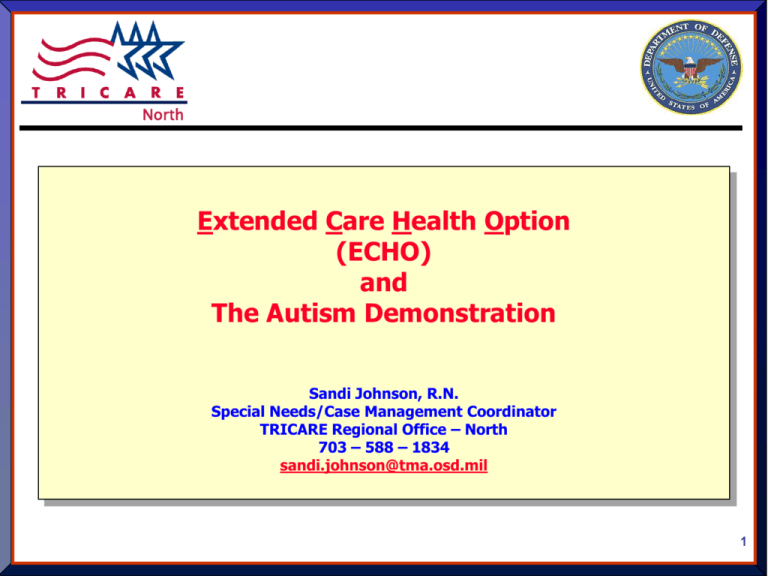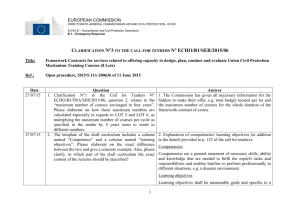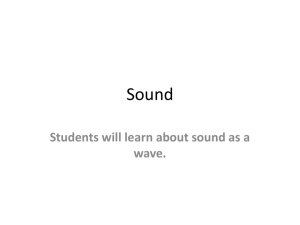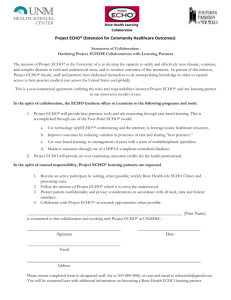North - MCCS Lejeune
advertisement

North Extended Care Health Option (ECHO) and The Autism Demonstration Sandi Johnson, R.N. Special Needs/Case Management Coordinator TRICARE Regional Office – North 703 – 588 – 1834 sandi.johnson@tma.osd.mil 1 DISCLAIMER North This presentation is designed to provide you with general program information only. Nothing said can be construed as a factual determination of benefits coverage in any specific case. Such determinations are made solely by the contractors in accordance with their contract and as provided in the policy. 2 North What does a Special Needs/Case Mgmt Coordinator for the TRO do? Monitor the performance of the MCSC Act as a liaison between the MCSC and each service, and between the MTFs and the MCSC Assist with the coordination of services for beneficiaries transferring from one region to another Assist with the coordination of services for beneficiaries in ICMP-PEC and CCTP Provide training on programs and benefits pertaining to the special needs population to MTFs, our MCSC, state agencies, EFMP staff and parents/caregivers Manage special projects related to the special needs population Assist with the resolution of challenging situations 3 Extended Care Health Option North Supplements the TRICARE basic program by: providing access to benefits/services not otherwise available through TRICARE; providing financial assistance (up to $2,500 per month) to beneficiaries who qualify, based on specific mental or physical disabilities. NDAA 2009, Sect.732 changed this to “not to exceed $36,000 per year”. This bill was signed by the President 14 Oct 2008, but it still requires Agency decisions regarding implementation and publication of a rule in the Federal Register before we will see it implemented. 4 Who is eligible for ECHO benefits? North Active Duty family members (including some activated Reservists and those in TAMP) who are enrolled in EFMP Survivors of a deceased service member 3 years from the date an AD sponsor dies, or Through age 21 if the sponsor died while receiving hostile-fire pay AND WHO have a Qualifying Condition (QC) 5 What is a Qualifying Condition? North Moderate or severe mental retardation Serious physical disability unable to accomplish unaided performance of at least one major life activity (Autism Spectrum Disorders) Extraordinary physical or psychological condition Multiple disabilities – cumulative effect Infants & toddlers under 3 yrs with a diagnosis of developmental delay 6 What are the ECHO benefits? North Diagnosis Treatment Medical, habilitative, rehabilitative services/supplies Durable Equipment Assistive technology devices including training Assistive services Special Education (IDEA) Applied Behavior Analysis (ABA) Vocational training Institutional Care 7 Additional benefits under ECHO North ECHO Home Health Care Not limited to part time or intermittent Capped by cost, not by hours (SNF reimbursement rate) EHHC Respite Care 8 hrs/day, 5 days per week Eligible beneficiary requires frequent interventions (requires training by medical personnel-but doesn’t have to be “skilled” interventions Sleep benefit ECHO Respite Care “dinner & a movie” benefit 16 hrs/month break for primary caregivers Can ONLY be used in a month when another ECHO benefit is being received Must use a Medicare certified agency RESPITE LIMITATIONS The Respite Benefits cannot be used for siblings, employment, deployment, or pursuing education AND they are not accumulative. 8 What is NOT an ECHO benefit? North Anything that is covered under Basic TRICARE including: PT, OT, and Speech therapy Hearing Aides – under Basic but still only for ADFMs –but FM systems are DE under ECHO All Durable MEDICAL Equipment Augmentative communication devices and (speech generating devices) 9 North Durable MEDICAL Equipment versus Durable Equipment Durable Medical Equipment - primarily serves a medical purpose; can improve, restore, or maintain function . . . or prevent the deterioration of the patient’s function or condition. Also covers customization and accessories for DME if it makes the DME useable or more useable for the beneficiary – not the caregiver. All DME is covered under Basic TRICARE benefits. Durable Equipment – doesn’t qualify as DME but does reduce the functional loss or disabling effects of a QC. MCSC can determine any item, that meets the criteria for a given patient, to be covered as long as it is not specifically excluded (spas, hot tubs, equipment with deluxe, immaterial, or non-essential features). Durable equipment is only covered by ECHO. The Bottom Line for DE “Is this something that would be purchased in the absence of the qualifying condition?” The response will tell you if it is covered. 10 ECHO Registration North Call the ECHO Coordinator in your area. Fax a copy of the entire DD 2792 or DD 2792-1 or the CG 55494 to Health Net.** Fax a copy of the child’s IEP or IFSP to Health Net. Health Net registers the beneficiary into DEERS through the HN Enrollment Dept with a code indicating ECHO eligibility. You do not need to re-enroll if you change regions but you do need to notify your ECHO coordinator – preferably before you relocate! ** NOAA and USPHS are exempt from this. Also beneficiaries who do not reside with the sponsor (i.e. parents are divorced) 11 ECHO Referral & Authorization Process North Acceptance into ECHO does not guarantee approval/authorization for a requested service or benefit even if it is ordered by a physician. A physician’s order is required for all ECHO and EHHC services. Prior authorization is required for all ECHO, ECHO Respite, EHHC and EHHC Respite services. 12 Costs North Pay Grade Monthly Cost Share E1 to E5 $25 E6 $30 E7, O1 $35 E8, O2 $40 E9, W1, W2, O3 $45 W3, W4, O4 $50 W5, O5 $65 O6 $75 O7 $100 O8 $150 O9 $200 O10 $250 TRICARE will pay up to $2500 per month for benefits, (exclusive of EHHC) after the monthly cost-share is paid. If the costs exceed $2,500 in any month, the beneficiary is responsible for the balance. If there are two or more persons with the same sponsor who receive services under ECHO, TRICARE requires payment of only one monthly cost share by the sponsor and TRICARE will pay up to $2500 for each ECHO-eligible beneficiary for ECHO benefits, exclusive of EHHC benefits. 13 DoD Autism Demonstration North The Enhanced Access to Autism Services Demonstration, went into effect 3/15/08. Designed to improve access to special ed services for eligible children with ASD. TMA has created a new class of provider which permits reimbursement of ABA services delivered by non-certified, but intensely supervised paraprofessionals whom we have called “Tutors”. 14 DoD Autism Demo (con’t) North Provider must be a TRICARE-authorized provider and will function as an Autism Corporate Services Provider. Must sign a Participation Agreement. Educational Interventions for ASD Supervisor (EIA) will provide supervisory oversight to EIA Tutors. Reimbursements are established by TMA : in 15 minute increments: Supervisors, $125/hour and Tutors, $50/hour 15 DoD Autism Demo (con’t) North Eligibility Must have a diagnosis of Autistic Disorder, Pervasive Developmental Delay Not Otherwise Specified, Asperger’s Disorder or Childhood Disintegrative Disorder Must be registered in ECHO Must be receiving special ed services Must be over the age of 18 months 16 CHECKLIST FOR PARENTS/GUARDIANS SEEKING SERVICES THROUGH THE AUTISM SERVICES DEMO North The Parents/Guardians Should: 1. Ensure the beneficiary’s Defense Enrollment Eligibility Reporting System (DEERS) record is current. 2. Enroll the beneficiary in the sponsor’s branch of service’s Exceptional Family Member Program (EFMP). Keep a hard copy of the DD-2792-1, signed by the EFMP representative, to submit to the Managed Care Support Contractor (MCSC) for your region. 2. Register the beneficiary in the Extended Care Health Option (ECHO) program with the ECHO case manager of your MCSC. 3. To begin services, the beneficiary must be 18 months or older. 4. Submit the beneficiary’s Individualized Family Service Plan (IFSP) or Individualized Education Program (IEP) documentation to the MCSC. If the beneficiary is homeschooled and your state does not require an IFSP or IEP, you must provide a letter from the beneficiary’s Primary Care Provider or Specialized ASD provider verifying that the disability related to Autism results in dysfunction severe enough to require special education and other support services. 5. Submit the beneficiary’s behavioral plan, developed by the Educational Interventions for Autism Spectrum Disorders (EIA) Supervisor to the MCSC for review prior to Demonstration services being authorized. The Medical Provider Should: 1. Submit verification and date of a DSM-IV diagnosis, made by a TRICARE-authorized Primary Care Provider or Specialized ASD Provider, of Autistic Disorder, Pervasive Developmental Disorder Not Otherwise Specified, Asperger’s Disorder or Childhood Disintegrative Disorder to the MCSC. 2. Submit additional information as may be requested by the MCSC to confirm eligibility. 17 Permanent Dependent Status North Start the process at least 6 months before the child turns 21 Sponsor must be providing more than 50% of the child’s support Onset of the disability must have been before the age of 21 Child must be incapable of self-sufficiency 18 Permanent Dependent Status (con’t) North Must submit: (addresses on handout) a current medical statement, preferably from the child's PCM, explaining in narrative format: the onset of the disability, the child's current physical and cognitive status, functional level (what the child cannot do or needs assistance doing is better than what the child can do) why the child is incapable of self support a copy of the child's birth certificate DD Form 1172 (Application for Uniformed Services ID card) DD Form 137-5 (Dependency Statement - Incapacitated Child Over Age 21) 19 A word about SSI and Medicaid . . . North If at first you don’t succeed, try, try again If you are medically eligible for one, you are medically eligible for the other When the child turns 18, financial eligibility is based on the child’s income not the parent’s Always make the adult child pay rent even if living at home 20 North TRICARE policies and benefits are governed by public law. Changes to TRICARE programs are continuous, and new benefits are often added or existing policies are changed . . . to make TRICARE a better program. 21 Additional Resources North www.hnfs.com www.militaryhomefront.dod.mil for access to the DOD Special Needs Parent Toolkit –type that in under SEARCH www.militaryonesource.com Stateside: 1-800-342-9647 Overseas: 1-800-342-96477 (yes, dial all those numbers) www.tricare.mil/specialneeds/default.cfm for access to the Special Needs Smart Book and the Special Care Organization Record (SCOR) www.nichcy.org NICHCY – National Information Center for Handicapped Children and Youth. Clearing house of information – mostly free www.washingtonpave.org - Specialized Training of Military Families (STOMP) 1-800-5-PARENT or 253-565-2266 22 North QUESTIONS 23





